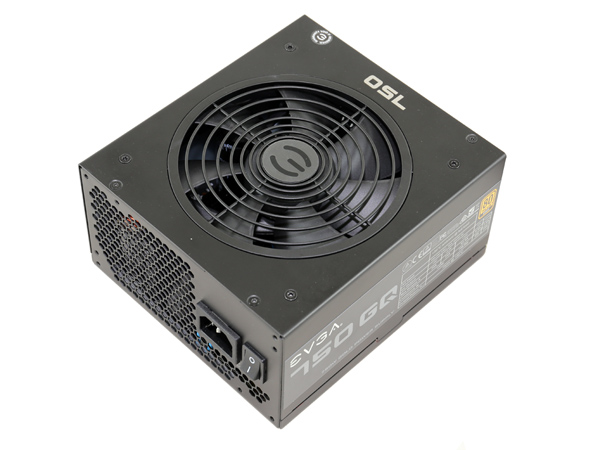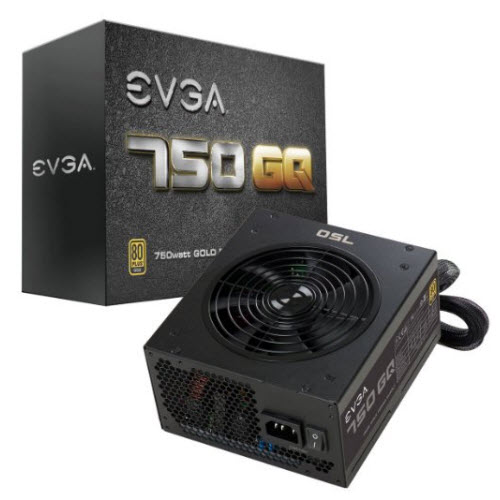Early Verdict
EVGA's 750 GQ offers decent performance with the only exception being the increased ripple on the minor rails. It is priced competitively and has high efficiency, but it lacks silent operation; however, at light loads the PSU's passive operation saves the day.
Pros
- +
Affordable • Full power at 47 °C • Efficient • Hold-up time • 6x PCIe & 2x EPS • Compact dimensions • Quality caps • FDB fan • Semi-passive mode • Warranty
Cons
- -
Ripple • Transient load response • No MOV in the transient filter • Load regulation at 3.3V • Noisy under stress • Few peripheral connectors and small distance between them
Why you can trust Tom's Hardware
EVGA 750 GQ Power Supply Review
EVGA cooperates closely with Super Flower, and it shows if you take a quick look at the company's high-end PSUs. However, EVGA is also working with other manufacturers, including FSP. Relying on just one manufacturer can be risky, especially if the company is as busy as Super Flower. On top of that, EVGA wanted to build a budget-oriented, mid-range platform that would allow it to pounce on the corresponding chunk of the market.
None of EVGA's mainstream PSUs are made by Super Flower, and in the mid-range segment, only its B2 line-up comes from the prolific OEM. For its entry-level models, EVGA uses HEC platforms exclusively, while the B1, G1 and now the GQ lines come from FSP.
The GQ series consists of four models with capacities ranging from 650W to 1kW. All of the PSUs are 80 Plus Gold-certified, use only Japanese capacitors and employ semi-modular cabling where only the ATX connector, which you need no matter what, is fixed. These units also feature a high-quality Fluid Dynamic Bearing (FDB) fan and, thanks to a semi-passive mode, promise silent operation under light and medium loads.
In order to lower production costs, the GQ platform uses an Active Clamp Reset Forward (ACRF) topology that offers good efficiency without requiring the extra (and expensive) components needed in a full- or half-bridge design, such as LLC resonant converters. Although we've seen well-built ACRF topologies demonstrate impressive overall results, their load regulation and ripple suppression performance isn't as high as top-notch full/half bridge topologies. That's why ACRF is mostly used in budget-oriented PSUs and not in high-end units. Regardless, FSP has lots of experience building ACRF-based PSUs, and we are curious to see how the 750W GQ model fares against its competition in this category.
Specifications
Besides 80 Plus Gold efficiency, EVGA's 750 GQ features semi-modular cabling and has a 50 °C temperature rating for full power delivery. On top of that, it is Haswell-ready thanks to the DC-DC converters it uses to generate the minor rails. All of the important protection features are included, according to EVGA's specs. Cooling is handled by a FDB fan that isn't particularly quiet at high rotational speeds; EVGA probably should have used a slower-spinning model. Thankfully, a semi-passive mode saves the day under light and moderate loads. The PSU's dimensions are compact, measuring a little over 16cm deep. And the provided warranty is shorter than EVGA's G2 line-up at just five years.
Power Specifications
| Rail | 3.3V | 5V | 12V | 5VSB | -12V | |
|---|---|---|---|---|---|---|
| Max. Power | Amps | 24 | 24 | 62.4 | 3 | 0.5 |
| Watts | 120 | 748.8 | 15 | 6 | ||
| Total Max. Power (W) | 750 |
A single +12V rail can deliver the unit's full power on its own. The minor rails are quite strong as well with 120W max combined power.
The 5VSB rail is adequate for a 750W PSU, while the -12V rail is of no real importance. We wonder why PSU manufacturers still spend money implementing its circuit.
Get Tom's Hardware's best news and in-depth reviews, straight to your inbox.
Cables And Connectors
| Modular Cables | ||
|---|---|---|
| Description | Cable Count | Connector Count (Total) |
| ATX connector 20+4 pin (610mm) | 1 | 1 |
| 4+4 pin EPS12V (650mm) | 2 | 2 |
| 6+2 pin PCIe (650mm) | 2 | 2 |
| 6+2 pin PCIe (650mm+100mm) | 2 | 4 |
| SATA (550mm+100mm+100mm) | 3 | 9 |
| Four-pin Molex (550mm+100mm+100mm) | 1 | 3 |
| FDD Adapter (+100mm) | 1 | 2 |
The 750 GQ has lots of cables and connectors, including a pair of EPS and six PCIe connectors. Although this is a mid-range PSU, its cable configuration easily meets the standards of high-end models in the same wattage range. You also get nine SATA connectors, which covers any combination of SSDs and hard drives we've seen. Only the number of four-pin Molex connectors looks low; we think there should be at least five of them. Lastly, the connectors mostly use 18-gauge wiring, which is what the ATX spec recommends.
Cable length is satisfactory overall. Our only complaint is the short distance between four-pin connectors. Usually, the devices powered by them are relatively far apart, so 10cm between each one will probably cause problems. Strangely, EVGA equips the 750 GQ with two FDD connectors instead of just one, and both are on the same lead. The company could have stuck with a single FDD connector and been fine.
Power Distribution
Since this PSU features a single +12V rail, we do not have anything to say about its power distribution.
MORE: Best Power Supplies
MORE: Power Supplies 101
MORE: How We Test Power Supplies
MORE: All Power Supply Content
Current page: EVGA 750 GQ Power Supply Review
Next Page Packaging, Contents, Exterior And Cabling
Aris Mpitziopoulos is a contributing editor at Tom's Hardware, covering PSUs.
-
10tacle Huh. Johnny Guru gave two variants of this PSU series recommended ratings back in Nov. & Dec (650, 850). I saw a 650W on sale at NewEgg last December for $50(US) after rebate and almost recommended it to a friend, but I didn't as I hadn't seen a JohnnyGuru review on the GQ series yet (they gave it a 9.4). They also gave the 850W version a 9.2 rating back in November.Reply
Not sure what happened with this 750W example, but it sounds more like what one would expect with a Corsair CX750 example. Definitely not the same results that Johnny Guru got with two different GQ variants. -
Aris_Mp The lower capacity GQ models use a different platform from the higher capacity ones (850W and more).Reply
The design of the 650 and 750 GQ models doesn't allow for better performance, especially in ripple performance. -
dstarr3 Eh, I'd stick with the G2 series. That's a lot more quality for only a small price premium. And really, the PSU is probably the worst place to cut costs in a system build.Reply -
basroil Oh god, another PoS EVGA unit that shares a similar name to the spectacular G2... I can see a flood of "my graphics card has coil whine", "my computer constantly crashes", and "my headphones have static/popping (only when playing games)" posts in the forum soon...Reply -
joz ReplyEh, I'd stick with the G2 series. That's a lot more quality for only a small price premium. And really, the PSU is probably the worst place to cut costs in a system build.
Agreed. G2 550 and 650's are great. And the P2 750+ if you need that sort of power are great too. But these...."craptacularripplefail," units EVGA is tossing out is really hurting their image. I understand market catering and such, but they need to rethink their strategy. They aren't going to win any price/perf races while Corsair can continue to throw their shitty cx units out the window to customers. And EVGA I hold to higher standards then Corsair, so its kind of a shame to see the performance of these lower quality power supplies. -
Dark Lord of Tech I would take the EVGA G2 , P2 , T2 over any other POWER SUPPLIES including Seasonic.Reply -
jonnyguru ReplyAgreed. G2 550 and 650's are great. And the P2 750+ if you need that sort of power are great too. But these...."craptacularripplefail," units EVGA is tossing out is really hurting their image. I understand market catering and such, but they need to rethink their strategy. They aren't going to win any price/perf races while Corsair can continue to throw their shitty cx units out the window to customers. And EVGA I hold to higher standards then Corsair, so its kind of a shame to see the performance of these lower quality power supplies.
Unfortunately, you can't be too profitable selling only niche higher end product. At some point, if you want the board of directors to let you continue putting out power supplies, you have to put something out that can do volume. The B2 Series, The GQ Series, etc. Don't like them? Don't buy them. Is it hurting their reputation? No. Not as long as higher end units like the G2, P2, etc. continue to be solid. But if they start to slip for whatever reason, then you can say their reputation is in jeoprady. Seriously. Hardly anybody judges the Corvette because of the Chevy Spark (well... maybe some Ford fanboys, but still). -
Dark Lord of Tech I like the GQ's and recommend them , also love the Corsair RMx series and recommend those too.Reply -
PureBlackFire ReplyHuh. Johnny Guru gave two variants of this PSU series recommended ratings back in Nov. & Dec (650, 850). I saw a 650W on sale at NewEgg last December for $50(US) after rebate and almost recommended it to a friend, but I didn't as I hadn't seen a JohnnyGuru review on the GQ series yet (they gave it a 9.4). They also gave the 850W version a 9.2 rating back in November.
Not sure what happened with this 750W example, but it sounds more like what one would expect with a Corsair CX750 example. Definitely not the same results that Johnny Guru got with two different GQ variants.
well, this is hardly the first time an FSP platform performed reasonably well at 650 watts and sucked at 750. sure it won't be the last either. as for the 850, like Aris said, based on a different (better) design.
-
10tacle Reply17373323 said:well, this is hardly the first time an FSP platform performed reasonably well at 650 watts and sucked at 750. sure it won't be the last either. as for the 850, like Aris said, based on a different (better) design.
That's just not right. A certain series should be of the same quality across the series offerings. There's a reason people shop for different series for their needs (budget vs. quality, etc.). Hell it's complicated enough already just trying to keep up with each OEM series line offerings and their quality tiers. I mean we all know the general quality difference between Corsair's CX line and EVGA's G2 line.

